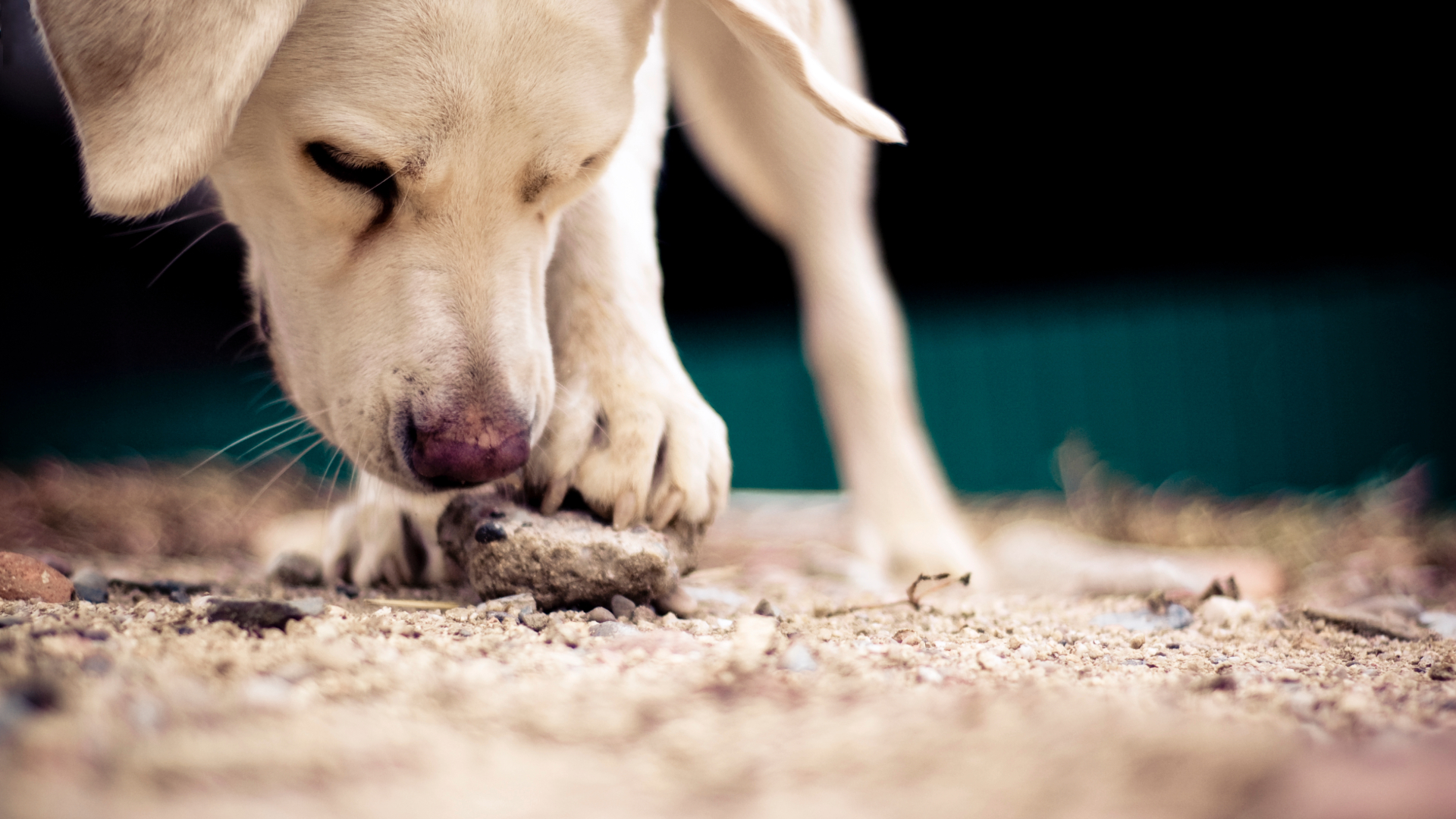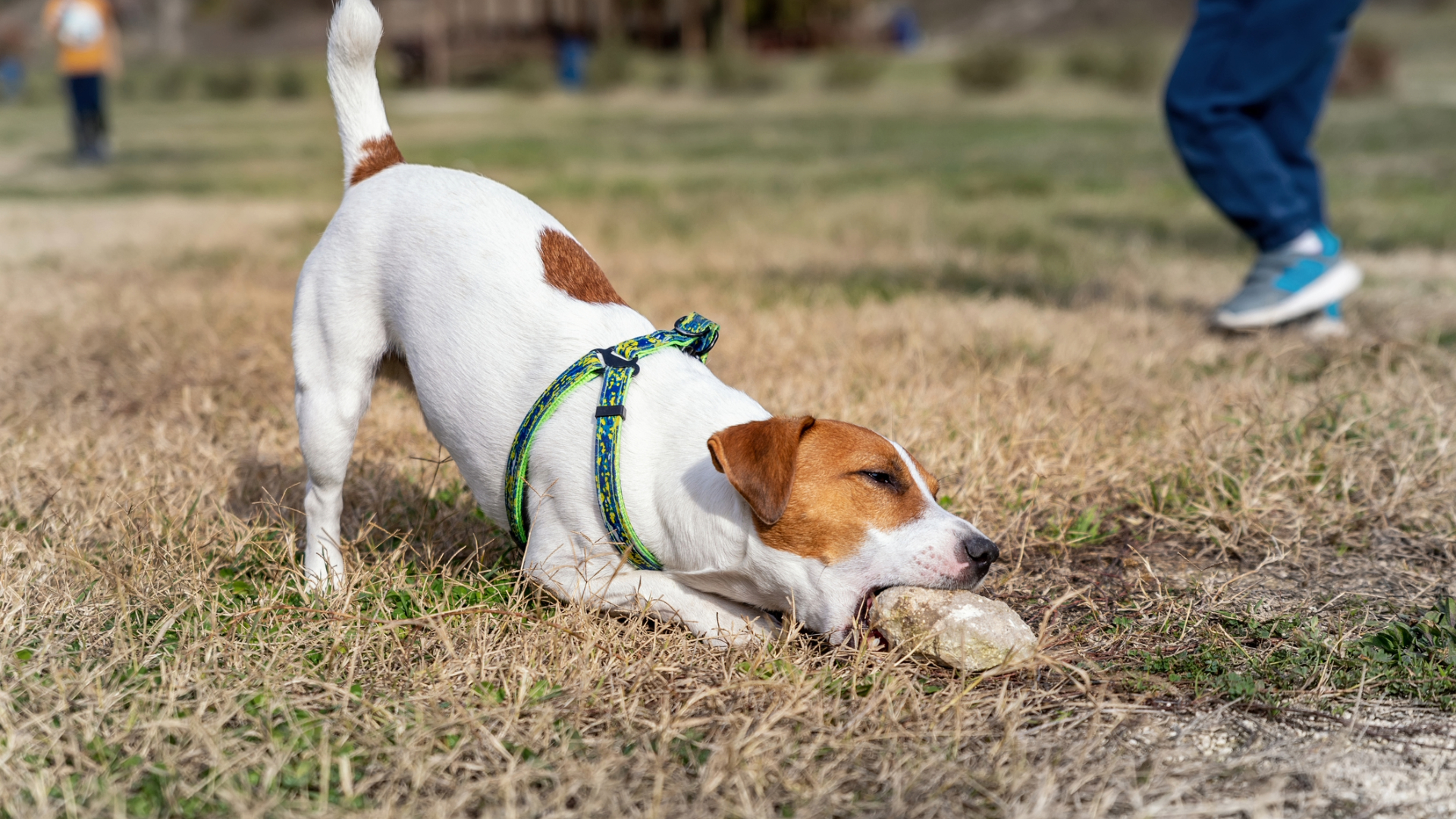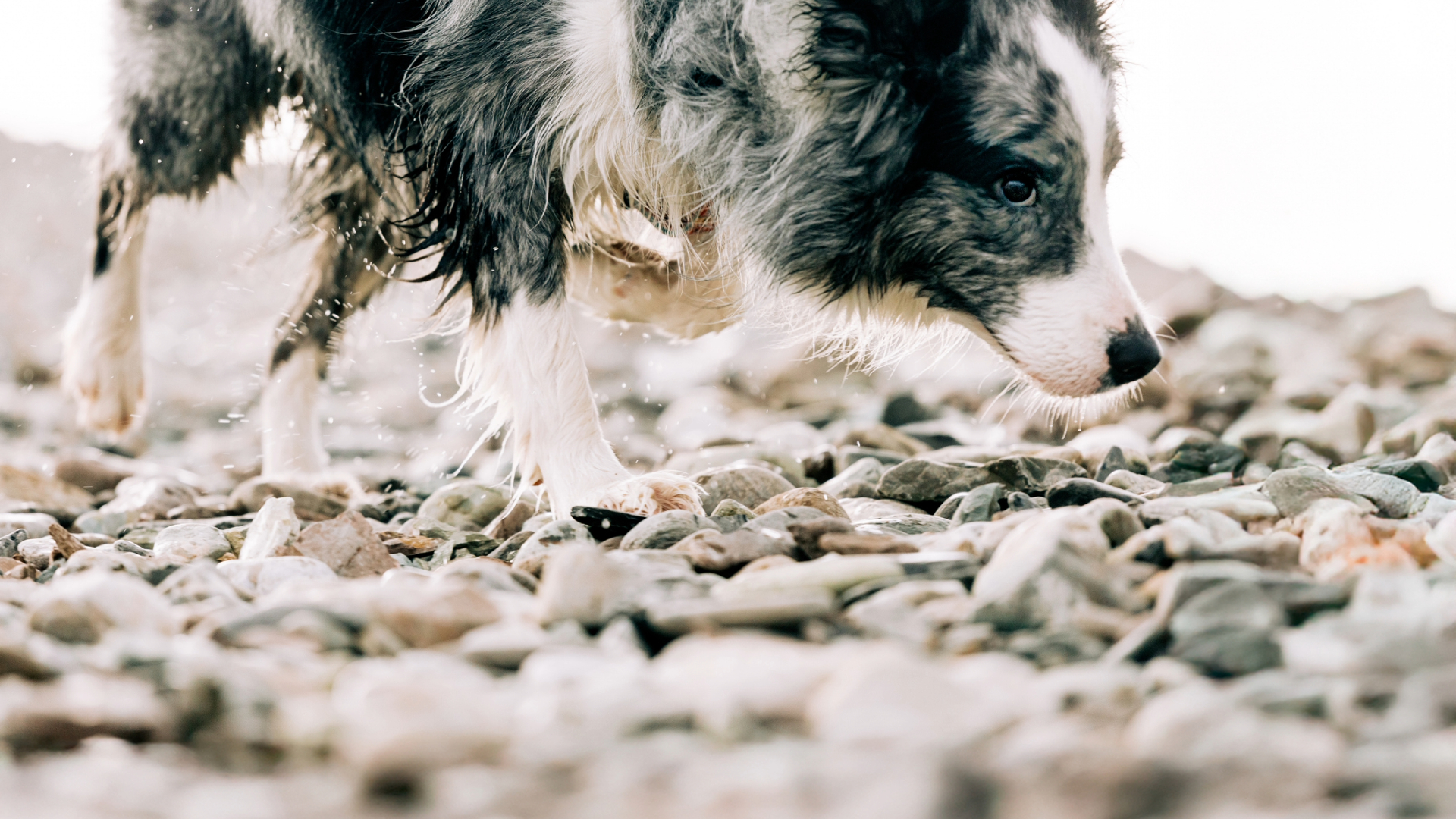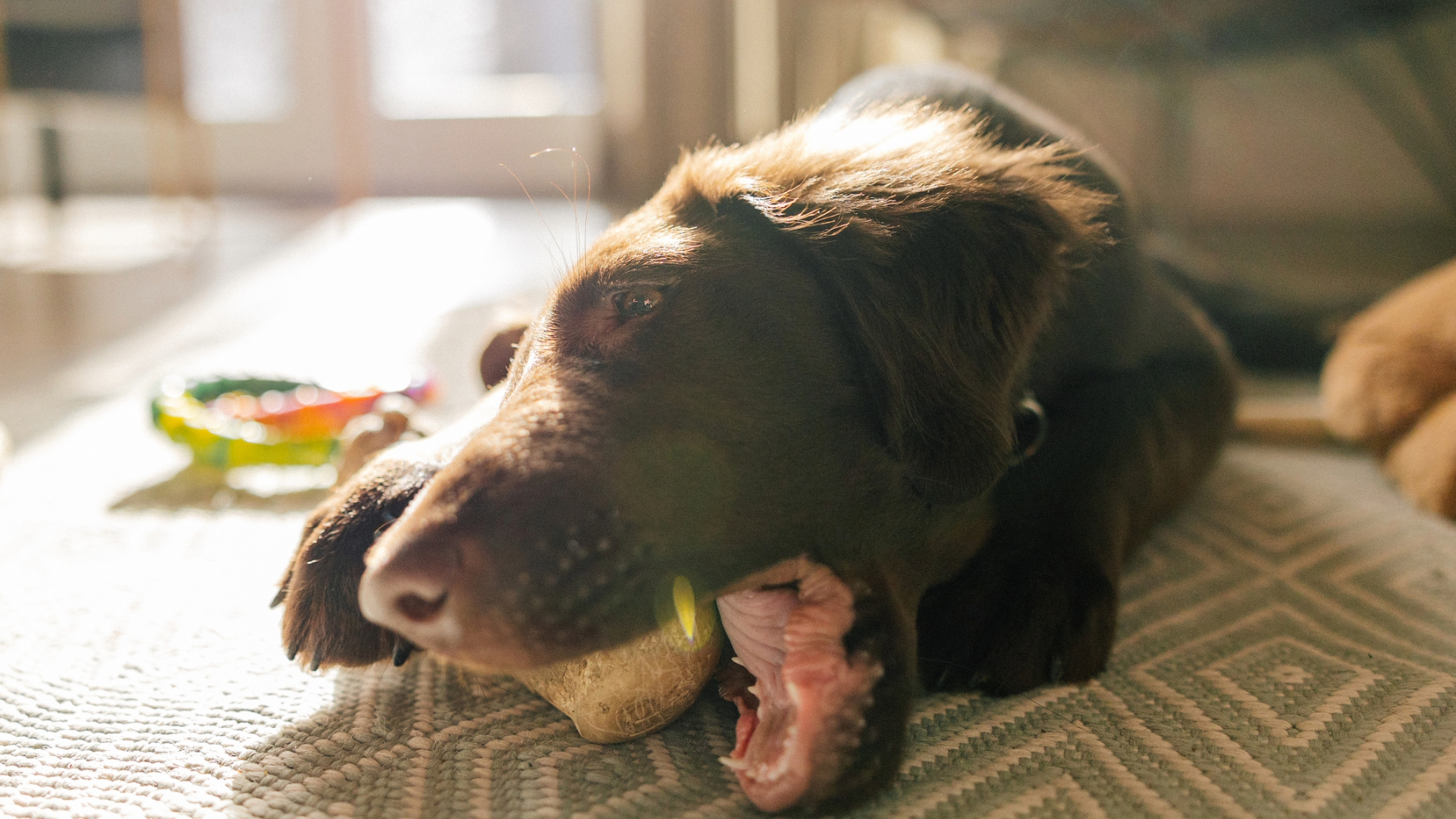Why is my dog chewing on rocks? A vet explains this risky habit
If you’ve ever caught your dog chewing on rocks, here’s what could happen and how to manage it

Get the best advice, tips and top tech for your beloved Pets
You are now subscribed
Your newsletter sign-up was successful
Dogs chewing rocks is something vets in practice see time and time again. It always sparks some concern from owners. Whether your pup is picking up pebbles on walks or gnawing on garden stones, it’s natural to wonder why they’re doing it and whether it’s something to worry about. In this article, we’ll dive into the reasons behind this curious behavior and explore what you can do to keep your dog safe.
I have been a practicing veterinary surgeon looking after dogs for nearly 14 years now. During this time I’ve treated several cases where rock-chewing has led to chipped teeth, gut issues, and even emergency surgeries – so it’s a topic I take seriously. As quirky as this habit may seem, it can carry real health risks if left unchecked.
While it’s important to understand the causes, it’s equally vital to offer your dog safe alternatives to satisfy their natural urge to chew. If your pup enjoys gnawing, check out the best long-lasting dog chews for safer, more satisfying options.
Why does my dog keep chewing stones?
If your dog seems to have developed a fondness for rocks, there could be a number of underlying reasons. Here are the most common:
1. Teething in puppies
Just like human babies, puppies experience discomfort when teething. Chewing helps soothe their gums, and sometimes they’ll pick up anything within reach – including rocks. While it’s more common in young dogs, older dogs may continue the habit if it’s been inadvertently reinforced.
2. Boredom or lack of stimulation
Dogs are intelligent, active animals who need both physical and mental stimulation. A bored dog will often find ways to entertain themselves, and chewing rocks might be one of them. This is particularly true for high-energy breeds who don’t get enough exercise or enrichment.
KONG Classic Stuffable Dog Toy | Amazon
Stuff this chew toy with your dog's favorite treats, and it will provide a great workout for their teeth and brain.
3. Anxiety or stress
Chewing can be a self-soothing behavior, so if your dog is feeling anxious or unsettled, they may turn to repetitive actions like chewing rocks. Separation anxiety, environmental stressors, or changes in routine could all trigger this.
Get the best advice, tips and top tech for your beloved Pets
4. Attention-seeking
Some dogs quickly learn that when they pick up a rock, they get a big reaction from their owner – whether it’s shouting, chasing, or trying to swap it. This can accidentally reinforce the behavior.
5. Dietary deficiencies or medical issues
In rare cases, chewing or eating non-food objects (a condition called pica) can be a sign of an underlying health problem, such as a nutritional imbalance, gastrointestinal issue, or even a neurological condition. It’s always best to rule out medical causes with your vet, especially if the behavior starts suddenly.

How do I stop my dog from eating rocks?
If your dog’s developed a taste for stones, don’t worry – there are practical steps you can take to manage and prevent the behavior:
1. Rule out medical causes
Before tackling the behavioral aspect, always get your dog checked by a vet. Blood tests and a physical exam can help rule out pica, (a condition where dogs compulsively eat non-food items) anemia, or other underlying problems.
2. Provide appropriate chews
Make sure your dog has access to safe, vet-approved chews that meet their need to gnaw. These long-lasting dog chews are a great place to start. Rotate toys to keep things interesting and avoid boredom.
3. Increase exercise and mental stimulation
A tired dog is a happy dog! Regular walks, training games, scent work, and puzzle toys can all reduce destructive or unusual behaviors linked to boredom.
4. Use positive reinforcement
If you see your dog walking past a stone without picking it up – make sure you reward them. Treats, praise, or a quick game can positively reinforce the behavior you want. If they do pick up a rock, avoid shouting – instead, offer a trade with a high-value treat and praise when they drop it.
5. Supervise closely on walks
Use a short lead in rocky areas and redirect their attention if they start sniffing around for stones. If your dog is particularly persistent, consider a basket muzzle when out and about – it might not be pretty, but it can be a helpful short-term tool while you work on training.
6. Consider behavior support
If the habit is proving hard to crack, a qualified behaviorist can offer tailored advice. Make sure to work with someone accredited by a recognized organization like the APBC or ABTC.

Is it dangerous for my dog to chew rocks?
Yes – chewing or eating rocks can be extremely dangerous for dogs. Here’s why:
- Broken teeth: Rocks are hard, and a powerful bite can result in fractured teeth. This can lead to pain, infection, and the need for dental surgery.
- Choking risk: Small stones can get lodged in the throat or airway, especially in smaller dogs or puppies.
- Intestinal blockage: If your dog swallows a rock, it can get stuck in the stomach or intestines. This is a surgical emergency and can be life-threatening.
- Internal injuries: Sharp stones can cause tears or perforations in the digestive tract, leading to peritonitis and other serious complications.
If your dog is showing signs of vomiting, reduced appetite, abdominal pain, straining to poop, or lethargy after chewing or swallowing rocks – contact your vet immediately.

Do dogs grow out of eating rocks?
This depends on the cause. Puppies often chew rocks while they are teething and many will grow out of it as they mature and get their adult teeth – especially if they have access to appropriate chews and puppy toys and are positively guided away from the behavior.
However, if the chewing is due to boredom, anxiety, or has been accidentally reinforced, it’s unlikely to go away on its own. Older dogs can become habitual rock-chewers, and without consistent intervention, the behavior can persist into adulthood and even old age.
The key is early management – offer suitable alternatives, reinforce positive behaviors, and seek help if you’re struggling. Most dogs can unlearn the habit with time, patience, and consistency.
While it might seem like a harmless quirk, dog chewing rocks is a behavior that deserves attention. Whether it’s driven by boredom, teething, or stress, there are steps you can take to redirect your dog safely.
Always start by ruling out any medical issues, provide safe chew alternatives, and enrich your dog’s daily routine. And if in doubt, don’t hesitate to reach out to your vet, they are here to help and always have your dog’s best interests at heart.
Read next: Safe dog chews for aggressive chewers and best durable dog toys

Emma graduated from the Royal Vet College in London in 2011. She has a keen interest in surgery and went on to do a postgraduate certificate in small animal surgery and was then awarded advanced practitioner status in the same discipline.
Edited by Megan Milstead.
This page was last updated in June 2025 by Emma Chandley.
Emma Chandley is a vet with 14 years of experience and has a keen interest in surgery. After graduating from the Royal Vet College in London in 2011, she achieved a postgraduate certificate in small animal surgery from the British Small Animal Veterinary Association and Nottingham Trent University. She was then awarded advanced practitioner status in the same discipline by The Royal College of Veterinary Surgeons. She has a black Labrador and two pygmy goats at home.

